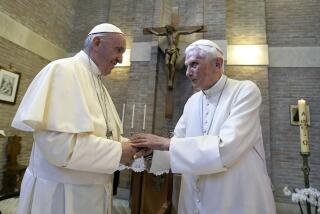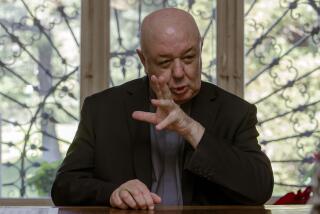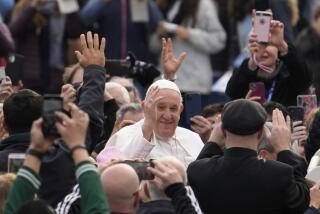MAN OF THE CENTURY: The Life and Times of Pope John Paul II.<i> By Jonathan Kwitny</i> .<i> Henry Holt: 754 pp., $30</i>
- Share via
During Pope John Paul II’s 1995 American visit, a television reporter commented, “When you look around the world, you have to ask yourself, who else is there?” And given the motley collection of boobs and Pygmies that currently stride the global stage--the Clintons, the Yeltsins, the Blairs, the Gingrichs--Karol Wojtyla casts a long shadow indeed.
So compelling a figure merits a biography, the more so since Wojtyla is clearly entering the twilight of what has been the longest papal reign since Pius IX’s in the mid-19th century. Jonathan Kwitny’s “Man of the Century” is the third major papal biography in the last two years, and there are more on the way. Kwitny is a former Wall Street Journal reporter and a specialist on the Cold War who hosted a well-regarded PBS news show and has a number of books to his credit. For the time being, “Man of the Century” must be considered the best life of Wojtyla available and, by a substantial margin, it is the most thoroughly researched, the most complete and offers the best balance between maintaining a sometimes prickly critical distance and showing open admiration for its subject.
The book is not without flaws. Kwitny argues that the pope was not merely a central figure in the collapse of Soviet Communism, which he clearly was, but also that he scripted it, in detail, beginning almost from his first days as a young bishop. On the weight of Kwitny’s own evidence, that seems implausible. As archbishop of Krakow, and later as pope, Wojtyla proved to be a supreme opportunist and master of diplomacy who brilliantly exploited the powerful symbolism of the papacy, the growing weakness of the Communists and the forces unleashed by the Solidarity movement to mediate a relatively bloodless revolution in Poland and, by extension, in the rest of central Europe.
But he was never the revolution’s puppet master, and the Polish revolution was not “his revolution,” as Kwitny would have it. Many of the leading figures, like Adam Michnik and Tadeusz Masowiecki, had been struggling against communism when Wojtyla was still in the seminary. In one part of the book, for example, Kwitny begins by ably summarizing a complex series of events that took place in the mid-1970s: In the wake of the brief 1968 “Prague Spring,” a largely Jewish group of anti-government intellectuals led by Michnik gradually formed links with Catholic intellectuals, centered in Krakow, who enjoyed Wojtyla’s protection. An attempt by the government to raise food prices led to a series of wildcat strikes, an inchoate student movement and the formation of Solidarity. Then Kwitny concludes, “Events were spinning forward exactly as Wojtyla had been pushing them,” which is nonsense. Events never “spin” according to anyone’s plan, and the forces at work were too multiple and deeply grounded to be attributed to a single individual.
That lapse aside, Kwitny’s skills as an investigative reporter are amply on display here. Although he did not have direct access to the pope, he seems to have tracked down everyone who ever spoke to him, worked with him or knew him. No legend goes unscrutinized. One famous story describes how, as a young priest, Wojtyla prevented the baptism of a Jewish child who had been given to a Christian family to protect it from the Nazis, insisting instead on locating the child’s Jewish relatives. Kwitny found the principals in the tale and concludes that it probably never happened.
The book is particularly strong on Wojtyla’s formative years. He was something of an odd duck as a young man: very religious, but passionately committed to the theater; given to writing mystical, somewhat murky, poetry; a bit of the hippie in his dress and long hair; and almost totally apolitical. (Ironically enough, many years later it was the Communist regime that pushed for his appointment to the critical See of Krakow, because the Communists thought he was a bishop they could work with.) Although Wojtyla had close women friends in the theater, he apparently never dated or had a romantic relationship. Gregarious and charismatic, he was the male star of his theater groups but usually avoided social events.
Wojtyla’s immense talents were clear from his earliest days. At the age of 22, he entered a secret nighttime seminary operated in Nazi-occupied Poland by the archbishop of Krakow. An excellent student, he was ordained four years later and sent to Rome for two more years of theological studies. Returning to Communist Poland in 1948, he flourished, first as a parish priest and even more as a university professor. Aside from his obvious intellectual and linguistic abilities, he was an unusually strong hiker, mountain climber and skier. His Outward Bound-type expeditions into the mountains and forests made him almost a cult figure among the university students. He would take dozens of students on strenuous expeditions almost every weekend, spending the evenings talking philosophy, ethics and religion. His appointment as a bishop came while he was on one such extended expedition. Wojtyla came home to receive the word officially, then amazed his fellow bishops by heading back to the mountains and his students. Although Wojtyla’s health has been shaky in recent years--he may be suffering from Parkinson’s disease--he stayed physically active into his 70s, even after he was seriously wounded in an assassination attempt. He certainly must be the first pope to head for the ski slopes on weekends.
One of Wojtyla’s attractions for young people in puritanical Poland was his willingness, even eagerness, to talk about sex. Most unusually for a Catholic bishop, Wojtyla stressed a “personalist” view of sex: the role of sexual fulfillment in human relations, the equality of men and women in the sexual sphere and the importance of the female orgasm. The main source for Wojtyla’s views on sexuality, according to Kwitny, was Wanda Poltawska, a Polish psychiatrist and sexologist who taught that sex outside marriage, birth control and failure to achieve female orgasm all led to neurosis and frigidity. Poltawska and her husband have been close friends of the pope for many years and, characteristically, Kwitny tracked them down and interviewed them at length. Consistent with Poltawska’s teachings, Wojtyla strongly opposed relaxing the Catholic rule against artificial birth control within marriage, and he was a primary draftsman of Pope Paul VI’s controversial 1968 encyclical reinforcing the ban. His unflinching support of the birth control prohibition made him a favorite of Paul VI, and may have been a major factor in his election to the papacy.
Kwitny is not intimidated by philosophy, and his thumbnail sketches of the pope’s intellectual roots are admirable and important in understanding who Wojtyla is and what he stands for. Despite his powerful support of human rights in Poland, Wojtyla is very much the Catholic traditionalist and certainly no democrat in the American sense of the word. America, in the pope’s eyes, is the modern Whore of Babylon; its decadence, consumerism and hedonism are as deadly a threat to religion as communism ever was. Error, in Wojtyla’s world view, does not have the same rights as truth, and he views Christianity as a third force between communism and Western liberalism. He seems to have expected that, in a post-Communist Poland, the church would be a kind of First Estate in the pre-French revolutionary sense of an active stakeholder and participant in the government. He has been gravely disappointed by the Poles’ refusal to allow the church to dictate the legislative agenda on issues like divorce and abortion.
The pope’s conservatism on “value” issues undoubtedly helped fuel stories of the close cooperation between the Vatican and the Reagan administration in orchestrating the fall of Communism. It was this “holy alliance” that Carl Bernstein portrayed in a Time magazine cover story and in his own recent biography of the pope, “His Holiness.” Kwitny, a longtime critic of the CIA and American Cold War policies, thoroughly, almost obsessively, shreds the Bernstein thesis. (Kwitny himself admits in a footnote that he may be guilty of “overkill,” as indeed he probably is. It would be as hard to believe that the Reagan administration had nothing to do with the fall of European communism as it would be to believe that the pope deserves all the credit.)
But obsessiveness, perhaps, is the key to being a good investigative reporter. The fall of Communism and the legacy of John Paul II to world Catholicism are world-turning historical issues. The pope’s critical role in dismantling one of history’s bloodiest dictatorships justifies his claim to the book’s title, “Man of the Century,” and his impact on the billion-strong Catholic Church has been enormous, although still controversial. Kwitny’s diligent research and readable chronicle will be a fundamental source for understanding these critical events for years to come.
More to Read
Sign up for our Book Club newsletter
Get the latest news, events and more from the Los Angeles Times Book Club, and help us get L.A. reading and talking.
You may occasionally receive promotional content from the Los Angeles Times.







